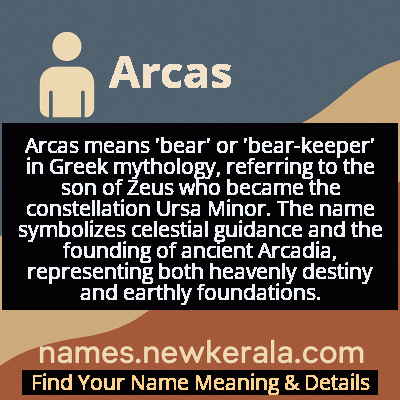Arcas Name Meaning & Details
Origin, Popularity, Numerology Analysis & Name Meaning of Arcas
Discover the origin, meaning, and cultural significance of the name ARCAS. Delve into its historical roots and explore the lasting impact it has had on communities and traditions.
Name
Arcas
Gender
Male
Origin
Greek
Lucky Number
6
Meaning of the Name - Arcas
Arcas means 'bear' or 'bear-keeper' in Greek mythology, referring to the son of Zeus who became the constellation Ursa Minor. The name symbolizes celestial guidance and the founding of ancient Arcadia, representing both heavenly destiny and earthly foundations.
Arcas - Complete Numerology Analysis
Your Numerology Number
Based on Pythagorean Numerology System
Ruling Planet
Venus
Positive Nature
Harmonious, responsible, caring, and artistic.
Negative Traits
Overly idealistic, superficial, possessive, or jealous.
Lucky Colours
Pink, turquoise.
Lucky Days
Friday.
Lucky Stones
Diamond, turquoise.
Harmony Numbers
2, 3, 9.
Best Suited Professions
Artists, musicians, teachers, healthcare workers.
What People Like About You
Warmth, nurturing nature, artistic flair.
Famous People Named Arcas
Arcas of Mythology
Mythological King
Founder of Arcadia and ancestor of the Arcadians
Arcas of Tegea
Ancient Greek Poet
Wrote mythological poems about Arcadian legends
Arcas the Historian
Greek Chronicler
Recorded early Arcadian history and genealogical traditions
Name Variations & International Equivalents
Click on blue names to explore their detailed meanings. Gray names with will be available soon.
Cultural & Historical Significance
The cultural impact of Arcas extends beyond mythology into geography, astronomy, and artistic representation throughout Western civilization. The region of Arcadia became synonymous with pastoral paradise in literature and art, influencing Renaissance and Romantic movements. His celestial representation as Ursa Minor provided practical navigation for ancient sailors while reinforcing mythological cosmology. The enduring legacy of Arcas in place names, artistic works, and astronomical references demonstrates how a single mythological figure can shape cultural concepts across millennia, from ancient Greek identity to modern ecological consciousness about humanity's relationship with the natural world.
Extended Personality Analysis
Individuals bearing the name Arcas often exhibit a unique blend of earthy practicality and celestial aspiration, reflecting their mythological namesake's dual nature as both earthly king and celestial guardian. They typically demonstrate strong protective instincts, particularly toward family, and possess natural leadership qualities that inspire loyalty in others. There's often a deep connection to nature and tradition, combined with an innovative spirit that allows them to bridge old wisdom with new possibilities. Their personality tends toward resilience and adaptability, capable of navigating significant life transformations while maintaining core values and relationships.
Many Arcas-named individuals display a contemplative nature, with an appreciation for both the practical and the mystical aspects of life. They often serve as stabilizers in their communities, providing guidance and continuity while respecting individual growth and change. There's frequently a sense of destiny or higher purpose about them, though typically expressed through grounded, practical actions rather than abstract idealism. Their strength lies in balancing wild independence with community responsibility, much like the mythological Arcas who governed the pastoral paradise while maintaining his celestial connection. This balance makes them effective in roles requiring both vision and practical implementation.
Modern Usage & Popularity
In contemporary naming practices, Arcas remains an uncommon but meaningful choice, primarily selected by parents with specific interest in Greek mythology, classical studies, or unique names with deep historical roots. The name sees occasional usage in Greece and among Greek diaspora communities, where it serves as a connection to cultural heritage and mythological tradition. While it doesn't rank on mainstream baby name charts in English-speaking countries, it maintains a steady presence in academic and classical circles, and has experienced a slight resurgence alongside the broader trend of mythological naming. Modern usage often emphasizes the name's celestial connections and environmental connotations, appealing to parents seeking names that reflect both ancient wisdom and contemporary ecological awareness. The name's rarity ensures distinctiveness while its mythological background provides rich narrative potential for personal identity.
Symbolic & Spiritual Meanings
The name Arcas carries profound symbolic weight representing the eternal cycle of transformation and the unbreakable bonds of family. As the mythological figure who became the constellation Ursa Minor, he symbolizes guidance and navigation—both literal in the celestial sense and metaphorical in life's journey. The name embodies the concept of foundation and origins, reflecting his role as founder of Arcadia and ancestor of the Arcadian people. Symbolically, Arcas represents the bridge between wild nature and civilized society, the mortal and divine realms, and the earthly and celestial spheres. His story symbolizes how love and loyalty can transcend even the most dramatic transformations, offering a powerful metaphor for enduring relationships through life's changes. The name also carries connotations of stewardship—both of natural environments and cultural traditions—making it symbolically rich for contemporary concerns about heritage preservation and ecological responsibility.

